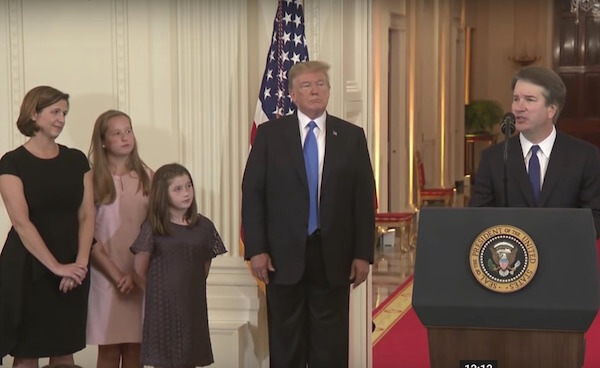BY PAUL SCHINDLER | Every presidential election cycle, Democrats talk about the importance of controlling appointments to the US Supreme Court. In the abstract, my bet is that the warning doesn’t often move many voters.
But it should.
There have been four big LGBT wins at the US Supreme Court: the 1996 decision that struck down Colorado’s anti-gay Amendment 2, which had barred the state or any municipality from enacting nondiscrimination protections; the 2003 win in Lawrence v. Texas, which threw out the nation’s remaining sodomy laws; the Windsor victory in 2013 that gutted the Defense of Marriage Act; and, of course, last year’s nationwide marriage equality triumph in the Obergefell case.
Our margins of victory were 6-3 in the first two cases — and a heart-stopping 5-4 in the two recent marriage rulings.
Meanwhile, the 2014 Hobby Lobby decision — which established a dangerous precedent for business enterprises to claim religious exemptions from laws of general application; in that instance, the contraception coverage requirements of President Barack Obama’s Affordable Healthcare Act — came in a 5-4 vote. Hobby Lobby raises troubling questions about the ability of businesses and other private actors to claim religious exemptions from LGBT nondiscrimination laws.
On issues beyond the specific scope of gay rights, the infamous 2010 Citizens United case, which opened up the spigot on unrestrained political spending by corporations and wealthy individuals, was also decided on a 5-4 vote.
In this year’s session of the high court alone, there are critical cases on which the court is sharply but closely divided involving abortion, affirmative action, contraception, immigration, organized labor, and voting rights.
Though these vital questions of public policy might not, in themselves, be enough to motivate the average voter, the flap surrounding the president’s right to name a successor to the late Justice Antonin Scalia might just be sufficient to awaken a greater concern about the importance of the Supreme Court in our lives.
Within hours of Scalia’s death being announced, Republicans, led by Senate Majority Leader Mitch McConnell, made clear they have little, if any inclination, to give Obama his third high court appointment. And that’s hardly surprising. In a nine-member court where Anthony Kennedy, though an appointee of Ronald Reagan, was often the swing vote, Scalia was among the three most reliable conservatives. Losing that seat to a Democratic president’s appointee — in the GOP’s not unreasonable assessment — would end the dominant role that conservatives have played on the high court dating back roughly 40 years.
Unfortunately for the Republicans, their strategy for avoiding this outcome relies largely on nullifying the fourth year of the president’s second term. When they argue the voters should have the right to decide, they are conveniently forgetting that voters have decided — twice, in 2008 and 2012. We have only one president at a time, and Barack Obama is that president.
Obama has made clear he has no intention of rolling over, and his fortitude may enable him to overcome the current GOP intransigence and see his nominee take their seat on the court. Given the quality of his previous two picks, I am confident about a future in which that justice joins Ruth Bader Ginsburg, Stephen Breyer, Sonia Sotomayor, and Elena Kagan on a court more amenable to concerns that progressive Americans, including the LGBT community, share. The willingness of Justice Kennedy to step up on gay issues in the past adds an added cushion of comfort.
Should the Republicans instead dig in their heels on any appointment by the president, I think the politics will work decisively against them, highlighting the radical right agenda behind their demand that the next president choose Scalia’s successor. The more the GOP presidential campaign focuses on demands for spurious religious opt-out rights, immigration restrictions and backlash, limits on women’s reproductive rights, deterrents to voter participation, unregulated big money political spending, and curbs on organized labor, the harder it will be for a Republican to win the White House.
At the end of the day, then, GOP stonewalling might succeed in denying Obama his court pick only to hand that choice to his Democratic successor. Our current president deserves the right to name the next Supreme Court justice, but I’ll be happy as long as Scalia’s replacement is not named by a Republican. And if GOP high court shenanigans make a Democratic win more likely, all the better in any event.


































